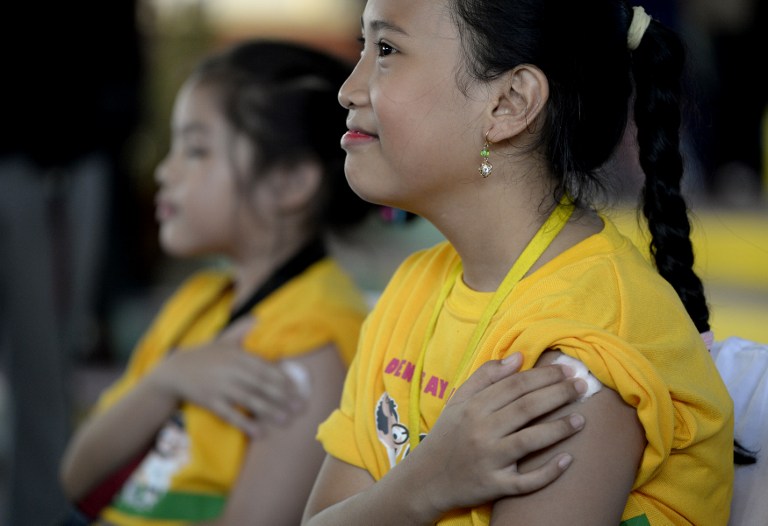
The Philippines began injecting up to one million school children with the world’s first vaccine for dengue fever, a mosquito-borne viral infection that is a leading cause of serious illness and death among children in some Asian and Latin American countries. / AFP / NOEL CELIS
(Eagle News) — The government’s dengue vaccination program that uses the Dengvaxia vaccine was temporarily halted.
This was after a statement released by its manufacturer, Sanofi, that said that people who have not contracted dengue before they were vaccinated with Dengvaxia could actually contract a more severe dengue disease because of the vaccine.
In a press briefing on Friday, Health Secretary Francisco Duque III said that the vaccination program on dengue using Dengvaxia would be put on hold at this time.
“Put on hold muna tayo sa ating vaccination sa dengue,” he said.
Although he said there were so far no reports of death among the schoolchildren who had been vaccinated in the previous DOH program, the DOH would continue to monitor those who had been given vaccines.
The Philippines was the first Asian country to approve the sale of Dengvaxia, which entered the Philippine market in January 2016.
Three months later, in April 2016, the DOH began its dengue vaccination program that targeted a million children. The vaccine was to be given every six months, or a spacing of six months. It is supposed to end by January 2018.
On Wednesday, Sanofi said that after six years of studying clinical data, it found out that the Dengvaxia vaccine would only benefit those who had previously contracted dengue, but is not recommended for those who have not contracted the disease before.
“Based on up to six years of clinical data, the new analysis evaluated long-term safety and efficacy of Dengvaxia in people who had been infected with dengue prior to vaccination and those who had not. The analysis confirmed that Dengvaxia provides persistent protective benefit against dengue fever in those who had prior infection,” Sanofi said in a press statement.
“For those not previously infected by dengue virus, however, the analysis found that in the longer term, more cases of severe disease could occur following vaccination upon a subsequent dengue infection,” it said.
“Vaccination should only be recommended when the potential benefits outweigh the potential risks (in countries with high burden of dengue disease). For individuals who have not been previously infected by dengue virus, vaccination should not be recommended,” Sanofi added.
The DOH had spent around P2.9 billion for the Dengvaxia vaccine from Sanofi.
Duque said that they will review the contract before by the DOH and Sanofi at that time. If necessary, they would determine if anyone should be held accountable for the contract.
The DOH will also secure a masterlist of all persons, including schoolchildren, who have been given the vaccine Dengvaxia. They will also identify those who have not had any dengue before the vaccine was given to them, and monitor if they had contracted the disease afterwards.







